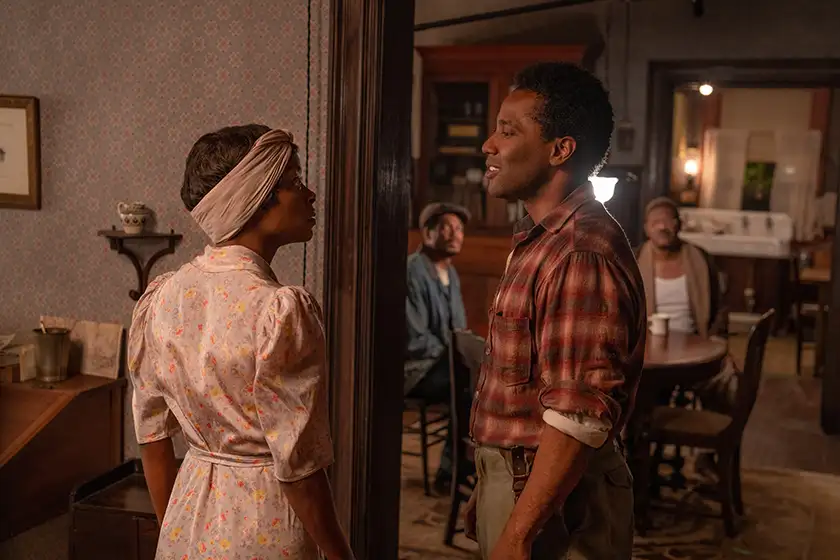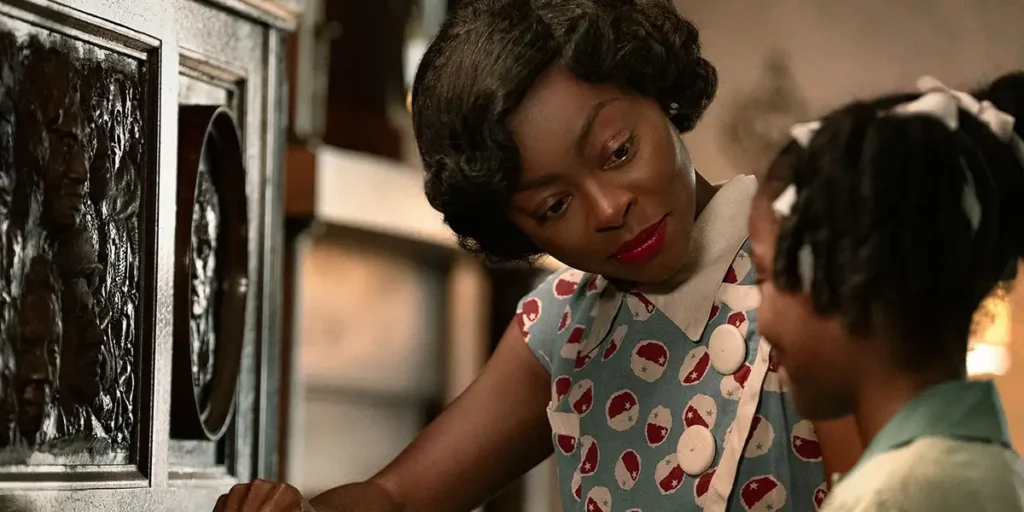The Piano Lesson is a powerful tribute to African American history and the sacrifices of those who came before us.
Director: Malcolm Washington
Genre: Drama
Run Time: 125′
BFI London Film Festival Screening: October 12-20, 2024
Theatrical Release: November 8, 2024 in select US theaters and UK & Irish cinemas
Streaming Release Date: November 22, 2024 on Netflix
The Piano Lesson begins on Independence Day: July 4th 1911. The country is celebrating with fireworks and parties, not so differently from the displays that we see on July 4th every year in the United States, except for the period costumes that immediately allow the audience to travel back in time. But not everyone is celebrating: in fact, a part of the population is entirely excluded from the festivities. Three young Black men are otherwise occupied, stealing the titular piano that tells the story of their once-enslaved family through its engravings.
As they escape, the fireworks light up the entire sequence with the colours of the American flag: red, white, and blue. One thing is clear from the very beginning: this is a story about the United States and its history.
Set in 1936 in Pittsburgh, The Piano Lesson is a family drama in the aftermath of the Great Depression. When the film starts, Boy Willie Charles (John David Washington, of BlacKkKlansman) has just come back home and declares his intention to sell the piano, a family heirloom he inherited from his father, to buy land. His sister Berniece Charles (Danielle Deadwyler, of Till) who is also entitled to the family piano, vehemently disagrees and wants to keep it in the family home. As the siblings argue back and forth on what to do with the piano nobody is playing, the history of the Charles family comes back to haunt them, in more ways than one.
At its best, The Piano Lesson is a family drama in the backdrop of a divided United States in the 1930s. Initially, this may seem like the story of one singular family but it is much more than that. The film is a tale of family values and relationships that many people in the audience will resonate with, as it analyses how our past informs our present and how we exist in this world thanks to the sacrifices made by those who came before us. By telling a family story, the movie paints the picture of a country struggling to come to terms with its dark and traumatic past and still plagued by racism and class division. This remains true today, in the 21st Century: a lot may have changed in the history of the country, but this commentary still rings very true.

Danielle Deadwyler is the star that shines the brightest in The Piano Lesson. While she may not technically be the protagonist, it is very much her performance and her character that carry us through this film from beginning to end. The cast also works well together in portraying a family dynamic of strong disagreements over the piano, a shared history, and ultimately love for one another. They are a joy to watch on screen together, interacting with each other in many new and different ways as the film goes on. John David Washington is impressive in a role he had previously performed on stage, bringing some theatre elements in the way he physically exists in the space as Boy Willie.
As a film adapted from a 1987 play of the same name by August Wilson, the inspiration from the stage play is clear in many ways. Some sequences are heavily theatre-inspired, so much so that you can almost see them playing out on a stage rather than in a movie. Some of this may not necessarily translate well in cinematic terms. Nevertheless, it is a powerful way of paying tribute to the okay it is based on, visually as well as narratively. This is especially true for the musical elements in The Piano Lesson, while successful and very necessary for the premise of the film, they seem misplaced at times in the overall tone of the movie.
In this sense, The Piano Lesson feels too confused in terms of its genre: part musical, part horror film, and part family drama, it never quite seems to decide what it wants to be in the end. Ultimately, this also hurts the pace of the movie, which takes a little too long to get started and develop all the elements it wants to explore. The ghost story elements are fascinating in terms of the commentary that they raise, as the ghost comes to literally symbolise the past and the way the characters deal with it. However, the film struggles to handle all these genre-bending elements during its runtime, which ends up being a little over two hours.
Overall, The Piano Lesson is a film that definitely needs to be seen with a big audience, partially even to recreate the theatre setting and context the film so often tried to evoke. It is also meant to be a shared experience in many ways. Just like the characters have to rely on each other to fight the evil taking over their house and unite despite all their difference, the viewers can also come together in a similar way and enjoy the humourous, sad, and heartfelt parts of this movie together.
The Piano Lesson will be screened at the BFI London Film Festival on October 12-20, 2024. The film will be released in select US theaters and UK & Irish cinemas on November 8, 2024 and streaming globally on Netflix from November 22, 2024.

